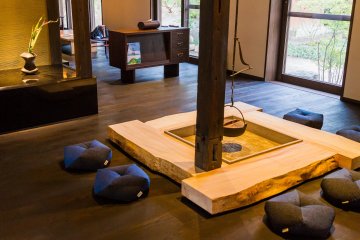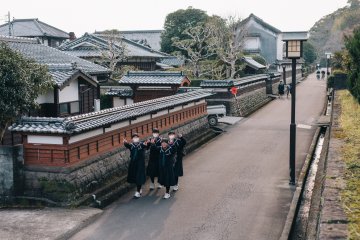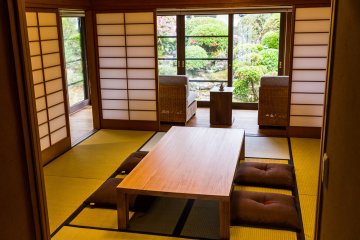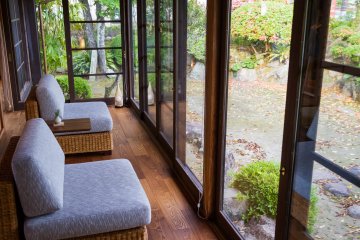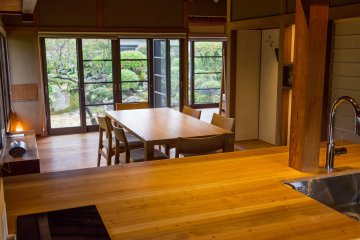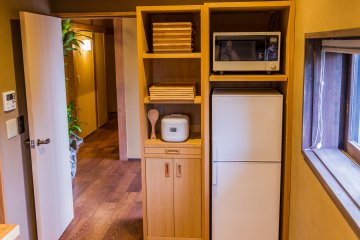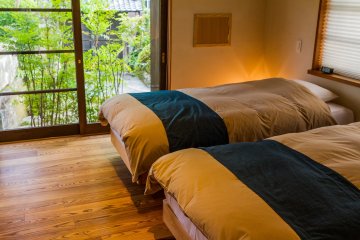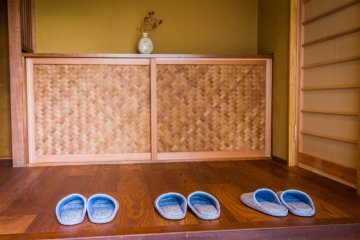If a samurai were time-warped from the Edo period to modern Japan, what kind of home would they live in? Let’s explore that question on a visit to a little castle town that still has its old city streets and preserved buildings—a can’t miss highlight of the rich cultural traditions Japan has to offer.
Entering one of the old bukeyashiki, or samurai residences, now mostly museums or restaurants, lets you peek into the traditional lifestyle of the warrior nobility. In a step beyond that, you can open the curtain and enter the living space of a samurai reserved for only you and your family or friends, wrapped in select finery of the modern world. It’s possible to spend the night in either of two special homes of the town of Obi in Miyazaki, renovated with only premium quality and taste, and live for a day or longer in luxurious tradition with contemporary comfort. Both residences are uniquely constructed and designed on the inside and outside, distinct even down to the silverware. This is Katsume.
Unlike a museum or historic restoration endeavor, the company that renovated this estate home, Kiraku, chose to upgrade the interiors instead of rebuilding them according to the original standards. Using the framework left by the old structure, the new homes were built on the principle of using natural materials and aesthetic luxury in concert with traditional culture. Katsume has been remade in old-fashioned Japanese style with the finest of modern carpentry and optimum lighting for aesthetic mood. Designed to be lived in comfortably, this historic residence utilizes modern artistry rather than museum antiques, creating anew the home of a samurai.
Much of Katsume’s structure and some older features remain, such as the ceilings and some ornamentations. On the modern side, you've got a super clean, electronically-enhanced toilet, instant water heater, washing machine, fridge, cooking stove, microwave, electric heating and air conditioning, and more, but they all blend in nicely with the new woodwork and atmosphere of the traditional home.
The core of the home actually lies outside of the building itself. Its 300-year-old Japanese garden, a designated prefectural cultural heritage site, is said to be designed by a monk inspired by an old landscape painting. Like a painting, it can be appreciated from within the residence itself. Large windows all along the front of the building allow the garden view to flow into most of the house. In this karesansui, or dry landscape, garden among the mossy stones, you’ll see azaleas, cherry and plum trees, camellias, magnolias, pines, and more to appreciate in any season—with sculpted nature in view whether you’re at the dining room table, on the comfortable lounge chairs of the engawa, from within the tatami room, or even from the bedroom. Sealing out any too-modern neighbors, stone walls guard the property and the traditional wooden gate controls passage from beyond to inside this oasis.
In the back of the home, there is a spacious bathroom. As the home is designed to sleep six, the bathroom has a pair of sinks and an unusual amount of room for a Japanese home. The shower stall has a stock of soap, shampoo, and other necessities, and for submerged relaxation you can enter the expansive pine bath for a deep soak.
Eating in can be part of your luxurious stay. Normally one may not think much of cooking while on vacation, but here it can be a real pleasure. Kiraku sets you up with with fine cutlery, quality pots and pans, and select handcrafted ceramics to serve your meals on. You’ll find complimentary coffee and tea here, too. There’s a full-sized fridge and a kitchen counter unusually wide for a Japanese residence to work at that looks into the beautiful dining room. There, meals can be taken at the solid-wood table for six.
Katsume is set in the historic center of Obi, within walking distance of museums, restaurants, and the old castle grounds. It also makes a great base for exploring the beautiful Miyazaki countryside and Pacific coastline. If Katsume is booked during your planned visit, you can also try a second renovated historic residence in the area, Ohya.



